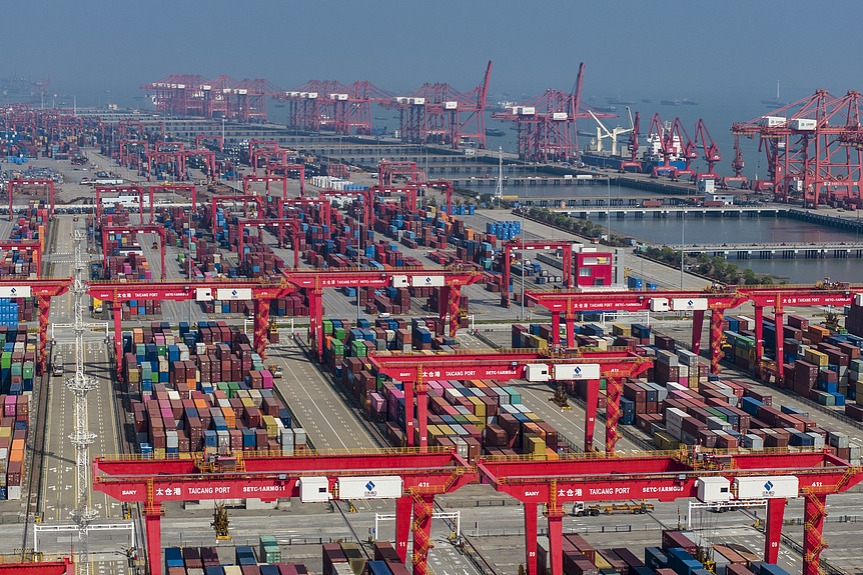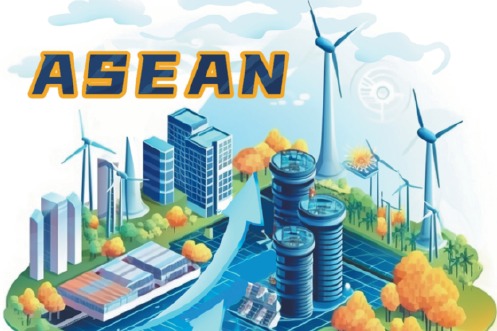Climate change: No contest


The US is attempting to beat China with fuel from the 19th century
Editor's note: The world has undergone many changes and shocks in recent years. Enhanced dialogue between scholars from China and overseas is needed to build mutual understanding on many problems the world faces. For this purpose, the China Watch Institute of China Daily and the National Institute for Global Strategy, Chinese Academy of Social Sciences, jointly present this special column: The Global Strategic Dialogue, in which experts from China and abroad will offer insightful views, analysis and fresh perspectives on long-term strategic issues of global importance.
The corruption at the heart of US democracy harms everyone. The destructive spillover effects of an excessive concentration of executive power in the hands of those backed by vested interests in the world's largest economy are global.
The $75 million donated by the fossil fuel industry to President Donald Trump's reelection campaign bought policy reform. Beyond the memorable meme "We will drill, baby, drill", it secured federal rejection of scientific evidence, transfer of pollution costs from industry to the global population, and a presidential guarantee of excessive profits.
The scientific evidence is clear: Greenhouse emissions and other pollutants are responsible for ill-health and deaths now, and an unlivable planet for our children's children. The $75-million donation is blood money taken from pockets of unsuspecting motorists and those US citizens denied access to clean electricity for the foreseeable future.
On his first day in office, President Trump declared a national energy emergency. This enabled him to activate special powers to be employed during a period of crisis or exigency. These powers have been used to undo much climate change legislation and to promote further exploitation of hydrocarbons.
While promoting oil exploration and production on federally owned land and water, the US has stopped granting approval for wind farms. It has revoked the 2021 Electric Vehicle Mandate which had sought to ensure that, by 2030, 50 percent of new vehicles sold in the United States would be electric. To this end, it has eliminated all Federal subsidies for non-polluting vehicles and frozen $5 billion approved by Congress to build a network of charging stations.
The administration is seeking to hide the science on global warming, demanding that reference to climate change be removed from federal websites. It has revoked the 2021 memorandum on scientific integrity, an attempt to curb political interference in scientific findings prevalent during President Trump's first administration. Federal scientists have also been instructed to stop work on activities related to climate assessment.
With the newly appointed head of the US Environmental Protection Agency Lee Zeldin recommending the reversal of its 2009 finding that greenhouse gas emissions endanger human health and welfare, this is to be reviewed in response to a presidential order. The Interagency Working Group on the Social Cost of Greenhouse Gases has been disbanded and all its guidance withdrawn. The relevant presidential order even includes the possibility of "eliminating the 'social cost of carbon' calculation from any Federal decision", effectively abandoning, as Stanford University Professor Marshall Burke explains, "any idea that climate change is a problem". The legality of these actions is contested.
The grounds for declaring the emergency appear spurious to neutral observers. The assertion — without evidence — is that "hostile state and non-state foreign actors have targeted US [our] domestic energy infrastructure, weaponized its [our] reliance on foreign energy".
However, the US is a net exporter of fossil fuels and imports less than one percent of its electricity, and that exclusively from Canada and Mexico, both members of the Canada-United States-Mexico Agreement. The US is currently extracting more oil than any other country in history and is the world's largest exporter of natural gas.
With the Trump administration intending to massively increase US carbon emissions, it is simultaneously withdrawing from international attempts to cope with the implications of global warming. The US has now withdrawn from the 2015 Paris Agreement for the second time. Unlike on the first occasion, when the US continued to participate in international discussions, officials have ceased attending meetings. Significantly, US experts were instructed not to attend the crucial Intergovernmental Panel on Climate Change meeting in Hangzhou in February.
The US has similarly exited the International Partners Group, a consortium of rich countries that has pledged money for South Africa, Indonesia, Vietnam and Senegal to transition from their high dependency on fossil fuels. It has also reneged on agreements reached as recently as 2022 at the COP27 in Sharm el-Sheikh in Egypt; the Loss and Damage Fund seeks to compensate low-income countries for the consequences of climate change caused by emissions, notably from the US that has historically been the world's largest emitter. In seeking to justify this action, officials could only refer to a presidential order entitled "Putting America First in International Environmental Agreements".
The corrupting influence of power concentrated in the White House has already been documented by environmentalists, noting companies back-stepping on their commitment to resist climate change for fear of vindictive repercussions. US enterprises cracked first, with social media companies contributing to President Trump's inauguration, and retailers, banks and investment companies such as BlackRock acquiescing and foregoing commitments to promote the achievement of net-zero emissions. Even philanthropic organizations have bent to the prevailing political wind, including the Bezos Earth Fund founded in 2020 to "fight climate change and support nature".
Foreign companies have felt forced to follow suit. Mitsubishi UFJ Financial Group (MUFG), Japan's largest lender and the world's ninth-biggest bank, is the latest to leave the Net-Zero Banking Alliance. The departure is telling since MUFG was represented on the alliance's steering committee. Leaks from the bank make clear that the decision was internally contested and that the bank's exposure in the US, where currently "environmental policies are ripped up and lambasted", was decisive.
President Trump's bid to chase unfettered and unsustainable economic growth contrasts markedly with China's commitment to an ecological civilization. Pursued since 2007 and now enshrined in the Chinese Constitution and echoed in the "Chinese Dream", the term embraces the meta-goal of the harmonious coexistence of human beings with nature. Equally, it refers to China's policy trajectory.
While late development means that China remains heavily dependent on fossil fuels, it was the first developing country to pursue a national climate change program, has consistently supported the UN and the Paris Agreement and, since 2016, has contributed $24.5 billion to supporting other developing countries combat climate change.
While maintaining output, China reduced direct employment in coal mining by 40 percent in the decade to 2022, and cut particulate pollution by 42 percent between 2013 and 2021. It is, by a considerable margin, the world's largest producer of green energy and increased solar production by 42 percent in 2024 alone. China now builds over 60 percent of the world's electric vehicles and supplies 80 percent of the batteries powering them.
China, then, is well placed to lead the world into a sustainable green future. Realizing this, is to crack the code of the US' "energy emergency". Unable to compete with China's decarbonizing economy, President Trump's hope is that, by drilling oil, the US can "sell to international allies …(an) affordable supply of energy … create jobs … improve the United States' trade balance … and help the [our] country compete with hostile foreign powers".
Technology in the 19th century, therefore, is to be pitted against that of the 21st century. However, given that China's vision of green mountains and waters leading to mountains of silver and gold is demonstrably superior to the smog and pollution of earlier times, there truly is no contest.
The author is a professor at the Jingshi Academy at Beijing Normal University and emeritus fellow of Green Templeton College at Oxford University. The author contributed this article to China Watch, a think tank powered by China Daily.
Contact the editor at editor@chinawatch.cn.


































